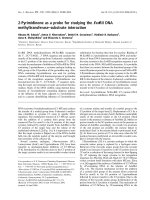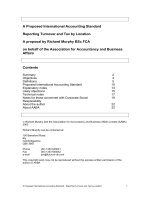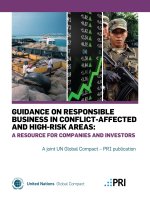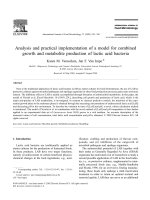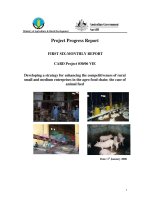money and trade considered, with a proposal for supplying the nation with money
Bạn đang xem bản rút gọn của tài liệu. Xem và tải ngay bản đầy đủ của tài liệu tại đây (261.88 KB, 133 trang )
Money and Trade Considered
With a Proposal for Supplying the Nation with Money
by John Law
1705
Money and Trade Considered with a Proposal for Supplying the Nation
with Money.
Edinburgh.
Printed by the Heirs and Successors of Andrew Anderson, Printer to the
Queens most Excellent Majesty,
Anno DOM. 1705.
There are several Proposals offer'd to Remedy the Difficulties
the Nation is under from the great Scarcity of Money.
That a right Judgment may be made, which will be most Safe,
Advantageous and Practicable; It seems Necessary, 1. That the Nature
of Money be inquired into, and why Silver was us'd as Money preferable
to other Goods. 2. That Trade be considered, and how far Money affects
Trade. 2. That the Measures have been us'd for preserving and
Increasing Money, and these now propos'd be examin'd.
Chapter 1
How Goods are valued. Of Barter, of silver; Its Value as a Mettal, its
Qualities fitting it for Money, and the Additional Value it received
from being us'd as Money.
Goods have a Value from the Uses they are apply'd to; And their
Value is Greater or Lesser, not so much from their more or less
valuable, or necessary Uses: As from the greater or lesser Quantity of
them in proportion to the Demand for them. Example. Water is of great
use, yet of little Value; Because the Quantity of Water is much
greater than the Demand for it. Diamonds are of little use, yet of
great Value, because the Demand for Diamonds is much greater, than the
Quantity of them.
Goods of the same kind differ in Value, from any difference in
their Quality. (Ex.) One Horse is better than another Horse. Barley of
one Country is better than Barley of another Country.
Goods change their Value, from any Change in their quantity, or
in the Demand for them. (Ex.) If Oats be in greater Quantity than last
year, and the Demand the same, or lesser, Oats will be less valuable.
Mr Lock sayes, The Value of Goods is according to their Quantity
in Proportion to their Vent. The Vent of Goods cannot be greater than
the Quantity, but the Demand may be greater: (Ex.) If the Quantity of
Wine brought from France be a 100 Tunn, and the Demand be for 500
Tunn, the Demand is greater than the Vent; and the 100 Tunn will sell
at a higher Price, than if the Demand were only equal to the Vent. So
the Prices of Goods are not according to the Quantity in Proportion to
the Vent, but in Proportion to the Demand.
Before the use of Money was known, Goods were exchang'd by
Barter, or Contract; and Contracts were made payable in Goods.
This State of Barter was inconvenient, and disadvantageous. 1. He
who desir'd to Barter would not always find People who wanted the
Goods he had, and had such Goods as he desir'd in Exchange.
2. Contracts taken payable in Goods were uncertain, for Goods of
the same kind differ'd in value.
3. There was no measure by which he Proportion of Value Goods had
to one another could be known.
In this State of Barter there was little Trade, and few Arts-men.
The People depended on the Landed-men. The Landed-men labour'd only so
much of the Land as serv'd the occasions of their Families, to barter
for such necessaries as their Land did not produce; and to lay up for
Seed and bad Years. What remain'd was unlabour'd; or gifted on
condition of Vassalage, and other Services.
The Losses and Difficulties that attended Barter, would force the
Landed-men to a greater consumption of the Goods of their own Product,
and a lesser Consumption of other Goods; or to supply themselves, they
would turn the Land to the product of the several Goods they had
occasion for; tho only proper to produce of one kind. So, much of the
Land uas unlabour'd,what was labour'd was not employ'd to that by
which it would have turn'd to most Advantage, nor the People to the
Labour they were most fit for.
Silver as a Metal had a value in Barter, as other Goods; from the
Uses it was then apply'd to.
As Goods of the same kind differ'd in value, so Silver differ'd
from Silver, as it was more or less fine.
Silver was lyable to a change in its Value, as other Goods, from
any change in its Quantity, or in the Demand for it.
Silver had Qualities which fitted it for the use of Money.
1. It could be brought to a Standard in Fineness, so was certain
as to its Quality.
2. It was easie of Delivery.
3. It was of the same value in one Place that it was in another;
or differ'd little, being easie of carriage.
4. It could be kept without Loss or Expense; taking up little
Room, and being durable.
5. It could be divided without Loss, an Ounce in four Pieces,
being equal in Value to an Ounce in one Piece.
Silver having these Qualities, 'its reasonable to think it was
used as Money, before it was coin'd. What is mean't by being used as
Money, is, that Silver in Bullion was the Measure by which Goods were
valued: The Value by which Goods were exchanged: And in which
Contracts were made payable.
He who had more Goods than he had use for, would choose to barter
them for Silver, tho he had no use for it; Because, Silver was certain
in its Quality: It was easie of delivery: It could be kept without
Loss or Expense: And with it he could purchase other Goods as he had
occasion, in Whole or in Part, at Home or Abroad, silver being
divisible without Loss, and of the same Value in different Places.
(Ex.) If A.B. had a 100 Sheep, and desired to exchange them for
Horses; C.D. had 10 Horses, which were equal to, or worth the 100
sheep, and was willing to exchange: But as A.B. had not present
occasion for the Horses, rather than be at the Expense of Keeping
them, he would barter his Sheep with E.F. who had the Value to give in
Silver, with which he could purchase the Horses at the time he had
occasion.
Or if E.F had not Silver, but was satisfied to give his Bond for
he Silver, or the Horses, payable at the time A.B. wanted them; A.B.
would choose to take the Bond payable in Silver, rather than in
Horses: Because Silver was certain in Quality, and Horses differ'd
much. So Silver was used as the value in which Contracts were made
payable.
Silver was likewise used as the Measure by which Goods were
valued, because certain in Quality. (Ex.) If A.B. had a 100 weight of
Lead, and desired to exchange it for Barley, the way to know what
quantity of Barley was equal in value to the Lead, was by the Silver.
If the 100 Weight of Lead was equal to five Ounces of fine Silver, and
5 Ounces of fine Silver equal to 20 Bolls of Barley, then 20 Bolls was
the Quantity to be given in exchange for the Lead.
Silver being easie of Carriage, so equal in one Place to what it
was in another; was used as the Measure by which Goods to be deliver'd
in different places were valued. (Ex.) If a Piece of Wine was to be
deliver'd at Glasgow by A.B. Merchant there, to the Order of C.D.
Merchant in Aberdeen: And the Value to be deliver'd in Oats at
Aberdeen by C.D. to the Order of A.B. The Wine could not be valued by
the Quantity of Oats it was worth at Glasgow, nor the Oats by the
Quantity of Wine they were worth at Aberdeen. Wine or Oats might
differ in Quantity, or be more or less valuable at the one Place than
at the other. The way to have known what Quantity of Oats was equal to
the Wine, was by the Quantity of Silver each was worth at the places
they were to be delivered. If the Piece of Wine was worth at Glasgow
20 Ounces of fine Silver, and 20 Ounces of fine Silver worth 50 Bolls
of Oats at Aberdeen; then 50 Bolls was the Quantity of Oats to be
given there in return for the Wine.
Silver being capable of a Stamp, Princes, for the greater
Convenience of the People, set up Mints to bring it to a Standard, and
Stamp it; Whereby its Weight and Fineness was known, without the
Trouble of Weighing or Fyning; but the Stamp added nothing to the
Value.
For these Reasons Silver was used as Money; Its being Coin'd was
only a Consequence of its being applyed to that use in Bullion, tho'
not with the same Convenience.
* Mr Lock and others who have Wrot on this Subject, say, The
general Consent of Men plac'd an imaginary Value upon silver, because
of its Qualities fitting it for Money. [*Lock, pag. 31. upon Interest,
and pag. 1, upon Money.]
I cannot conceive how different Nations could agree to put an
Imaginary Value upon any thing, expecially upon Silver, by which all
other Goods are valued; Or that any one Country would receive that as
a Value, which was not valuable equal to what it was given for; Or how
that Imaginary Value could have been kept up. But, suppose France
receiving Silver at an Imagainary Value, other Nations receiv'd it at
that Value, because receiv'd so in France: Then for the same Reason a
Crown passing in France for 76 Sols, should pass in Scotland for 76
Pence, and in Holland for 76 Stivers. But on the contrair, even in
France where the Crown is rais'd, 'tis worth no more than before when
at 60 Sols.
It is reasonable to think Silver was Barter'd as it was valued
for its Uses as a Mettal, and was given as Money according to its
Value in Barter. The additional Use of Money Silver was apply'd to
would add to its Value, because as Money it remedied the Disadvantages
and Inconveniences of Barter, and consequently the demand for Silver
encreasing, it received an additional Value equal to the greater
demand its Use as Money occasioned.
And this additional Value is no more Imaginary, than the Value
Silver had in Barter as a Mettal, for such Value was because it serv'd
such Uses, and was greater or lesser according to the demand for
Silver as a Mettal, proportioned to its Quantity. The additional Value
Silver receiv'd from being used as Money, was because of its Qualities
which fitted it for that Use; And that Value was according to the
additional demand its Use as Money occasioned.
If either of these Values are Imaginary, then all Value is so,
for no Goods have any Value, but from the uses they are apply'd to,
and according to the Demand for them, in proportion to their Quantity.
Thus Silver having a Value, and Qualities fitting it for Money,
which other Goods had not, was made Money, and for the greater
convenience of the People was Coin'd.
The Names of the different Pieces might have been Number 1.
Number 2. and so on; Number 60 would have the same as a Crown; For the
Name and Stamp was only to certify, that the Piece had such a Quantity
of Silver in it, of such a fineness.
Goods of any other kind that have the same Qualities might then,
and may now be made Money equal to their Value. Gold and Copper may be
made Money, but neither with so much Convenience as Silver. Payments
in Copper being Inconvient by reason of its Bulk; and Gold not being
in so great Quantity as to serve the Use of Money. In Countries where
Gold is in great Quantity, it is used as Money; And where gold and
silver are scarce, Copper is used.
Gold is coin'd for the more easie Exchange of that Mettal and
Copper to serve in small Payments; but Silver is the measure by which
Goods are Valued, the Value by which Goods are Exchang'd, and in which
Contracts are made payable.
As Money encreas'd, the Disadvantages and Inconveniences of
Barter were remov'd; the Poor and Idle were employ'd, more of the Land
was Labour'd, the Product encreas'd, Manufactures and Trade improv'd,
the Landed-men Lived better, and the People with less Dependance on
them.
Chapter 2
Of Trade, and how far it depends on Money. That the Encrease of
the People depends on Trade. Of Exchange.
Trade is Domestick, or Forreign.
Domestick Trade is the Imployment of the People, and the Exchange
of Goods within the Country.
Forreign Trade has several Branches.
1. The Product and Manufacture being more than the Consumption, a
part is Exported, and in Return Forreign Goods are brought Home.
2. Selling the Goods Exported at one Port, and Loading there to
sell at another; Whereby a greater Return is made, than if the Goods
Exported had been carryed directly there.
3. Bringing Home the Product and Manufacture of other Countries,
from whence, and when they are Cheap; To supply Countries where, and
when they are dear.
4. Bringing Home the Product of other Countries, and Exporting it
in Manufacture.
5. Freighting, or hireing out Ships.
Domestick and Forreign Trade may be carried on by Barter; But not
for so great a Value as by Money, nor with so much convenience.
Domestick Trade depends on the Money. A greater Quantity employes
more People than a lesser Quantity. A limited Sum can only set a
number of People to Work proportion'd to it, and 'tis with little
success Laws are made, for Employing the Poor or Idle in Countries
where Money is scarce; good Laws many bring the Money to the full
Circulation 'tis capable of, and force it to those Employments that
are most profitable to the Country: But no Laws can make it go furder,
nor can more People be set to Work, without more Money to circulate
so, as to pay the Wages of a greater number. They may be brought to
Work on Credit, and that is not practicable, unless the Credit have a
Circulation, so as to supply the Workman with necessaries; If that's
suppos'd, then that Credit is Money, and will have the same effects,
on Home, and Forreign Trade.
An addition to the Money adds to the Value of the Country. So
long as Money gives Interest, it is imployed; and Money imployed
brings Profite, tho' the Imployer loses. (Ex.) If 50 Men are set to
Work, to whom 25 shillings is payed per day, and the Improvement made
by their Labour be only equal to, or Worth 15 sh. Yet by so much the
Value of the Country is increased. But as it is reasonable to suppose
their Labour equal to 40 sh. So much is added to the value of the
Country, of which the Imployer gains 15 sh. 15 may be supposed to
equal the Consumption of the Labourers, who before lived on charity,
and 10 sh. remains to them over their Consumption.
If a Stone of Wooll is worth 10 sh. and made into Cloth worth 2
Pound; The Product is improv'd to four times the Value it had in
Wooll: the Workmen may be supposed to consume more than when they were
not imployed; Allow one 4th, the Nation is Gainer double the value of
the Product. So an Addition to the Money, whether the Imployer gains
or not, adds to the National Wealth, eases the Country of a number of
Poor or idle, proportioned to the Money added, enables them to live
better, and to bear a share in the Publick with the other People.
The first Branch of Forreign Trade, which is the Export and
Import of Goods, depends on the Money. If one half of the People are
employ'd, and the whole Product and manufacture consum'd; More Money,
by employing more People, will make an Overplus to Export: If then the
Goods imported ballance the Goods exported, a greater Addition to the
Money will imploy yet more People, or the same People before employed
to more Advantage; which by making a greater, or more valuable Export,
will make a Ballance due. So if the Money lessens, a part of the
People then imployed are set idle, or imployed to less advantage; the
Product and Manufacture is less, or less valuable, the Export of
Consequence less, and a Ballance due to Forreigners.
The 2d and 3d Branches of Forreign Trade, call'd the Trades of
Carriage; are monopoliz'd out of Europe, by these Countries who have
Colonies; and in Europe by these who sell cheapest.
Scotland has Advantages for Trade by which the Merchants might
undersel Merchants in Holland, as cheapness of Living, paying less to
the Publick, having Workmen, Seamen, and Provisions for vicutaling
cheaper: but if the Dutch Merchants Stock is 10000 lib. and his yearly
Expense 500; he can trade at 10 per cent Profit, and add yearly 500
lib. to his Stock. Wheras a Scots Merchant, whose Stock is 500 lib.
and his yearly Expense 50; cannot trade so cheap.
If 'tis ask't how a Dutch Merchant trades wo has only 500 lib.
Stock? He restricts his Expense so as he can afford to trade at 10 per
cent Profit: Or Money being in greater Quantity in Holland, whereby it
is easier borrowed, and at less use; He gets Credit for more a 3 or 4
per cent, by which he gains 6 or 7. And unless Money be in greater
Quantity in Scotland, or Expense retrench'd, we cannot trade so cheap
as the Dutch; Tho' we have Advantages for Trade that they have not,
and tho' they be under Disadvantages we are not lyable to. By a
greater quantity of Money and Oeconomy, the Dutch monopolize the
Trades of Carriage even from the English.
The 4th Branch of Forreign Trade, Bringing home the Product of
other Countries, and Exporting it in Manufacture, depends on the
Quantity of Money. We are so far from Competing with the Dutch in this
Trade, that our Wooll was sent to Holland, and imported from thence in
manufacture; under the difficulty of a Prohibition on the Export of
the Wooll, and on the Import of the Manufacture. Yet besides the
Advantages already named, which we have for Trade over the Dutch, the
Material is the Product of our Country, and greater Priviledges are
granted to Manufacturers here, than in Holland.
'Tis alledged, if the Prohibition had continued, Manufactures
might have come to Perfection.
The Advantage some Men made by Manufacture, may have occasion'd
the setting up of more, while the Money has been diminishing; But that
Money so employ'd, has been taken from some other use it was before
imploy'd in: For Money cannot serve in two Places at one time.
'Tis alledg'd, That the allowing the Wooll to be exported,
occasioned the Exportation of the Money. That at one time 5000 lib.
was sent to England to buy Wooll. 'Tis askt what became of that Wooll?
They Answer, it was sent to France for Wine. Then, as 5000 lib. of
English Wooll may be worth 8 or 10 Thousand Pound in France; So the
5000 lib. sent to England, saved the sending out of 8 or 10000 lib. to
France.
To these who don't throughly Examine the State of this Country,
it may seem odd that Wooll should be allowed by Law to be Exported:
But if the Product of Scotland cannot be Manufactur'd with less than
50000 People, and the Money that can be spar'd to Manufacture, be only
capable to employ 25000, one half of the Product will be lost if it is
not allowed to be Exported.
The 5th Branch, the Freighting of Hireing out of Ships, depends
on the Money, and the other Branches of Trade. Where Ships are in use
to be Freighted by Strangers, and supported by a great Demand for
their own Trade; There are all sorts of Ships are to be hired Cheaper
than in other places; And Merchants are sure of such Ships as are
proper for the Goods they Load with, and the Countries they Trade to.
This Trade of Freighting brings the Goods of other Countries to
Holland, tho design'd for Sale else where. If Woollen Manufacture from
England to Portugal yields 25 per cent Profit, and to Holland 15; The
English Merchant will choose to send such Goods to Holland for 15 per
cent, rather than to Portugal for 25: And the Dutch Merchant who is
able to Trade cheaper, from the Cheapness of Freight, etc. is
satisfied for the other 10 to carry to Portugal.
Most Authors who have Wrote on Trade divide it into National and
Privat. They say, A Merchant may gain where the Nation loses. If a
1000 Lib. is Exported to the Indies in Money or Bullion, and a 1000
Lib. in Goods or Provisions; The return worth 8000 Lib. the Merchant
gains 6000; But as these Goods are all consum'd in the Country, the
Nation loses the 1000 Lib. Money or Bullion Exported.
They don't consider whether the 8000 Lib. of Goods imported (all
suppos'd to be consum'd in the Country) does not lessen the
Consumption of the Product or Manufacture of the Country, so as to
occasion an addition to the Export, at least equal to the 1000 lib.
Money or Bullion Exported. But allowing they do not lessen the
Consumption of the Goods of the Country, and the Use of them be not at
all necessary; Yet these Goods being worth 8000 lib. at Home or
Abroad, the Nation gains 6000. If the People consume them, and in
extravagant Uses, that's not the fault of the Trade, nor for that
Reason should that Trade be call'd Disadvantageous; It is the fault of
the Government, who ought to hinder the too great Consumption of
Forreign Goods; Especially, such as might be wanted without causing a
greater Consumption of the Goods of the Country. That care being
taken, by making the vent less profitable at Home, than Abroad;
Merchants would Export them, or for the future lessen the Import.
If East-India Goods that Sell for a 1000 lib. in England, are
only worth Abroad 800 Lib, the Duty payed at their entry being
return'd, and more given as a draw-back to Encourage the Export, their
Vent Abroad will be more Profitable than in England.
A People may consume more of their own or Forreign Goods, than
the Value of the Product, Manufacture, and Profits by Trade; but their
Trade is not disvantageous, it is their too great consumption: And the
too great consumption of the Product and Manufacture of the Country,
may be als hurtful as that of Forreign Goods; For, if so much is
consumed, that the remainder Exported won't pay the Consumption of
Forreign Goods, a Ballance will be due, and that Ballance will be sent
out in Money or Bullion.
A Nation may gain where the Merchant loses, but wherever the
merchant gains, the Nation gains equal, and so much more, as the
Maintenance and Wages of the People employ'd and the Duty on the Goods
amounts to. If a ship insur'd is lost, the Nation loses, and the
Merchant loses nothing; But in that case the insurer is the Merchant,
and loses equal to the Nation.
As Trade depends on Money, so the encrease or decrease of the
People depends on Trade. If they have Employment at Home, they are
kept at Home: And if the Trade is greater than serves to Employ the
People, it brings more from places where they are not Employ'd. Sir
William Petty Values a Man at 20 years Purchase, by that Computation a
Seaman whose Wages is 40 shil. a Month, is Valued 430 lib.
Scotland has a very inconsiderable Trade, because she has but a
very small part of the Money. There is a little Home Trade, but the
Country is not Improv'd, nor the Product Manufactur'd. There is a
little of the first Branch of Forreign Trade, and that is carried on
with great Disadvantage to the People, who pay dearer for most
Forreign Goods, and are worse serv'd, than other Nations: If they have
any Cheaper, 'tis from the lower Duty on the Import. In Scotland low
Prices are given for Goods Bought up to be Exported, the Merchants
Profit being great: If a 100 Stone of Wool is worth in Holland 10
Piece of Linen Cloth, these ten Pieces are Sold in Scotland for the
Value of a 180 or 200 Stone of such Wool. Such Goods as do not yeild
that great Profit; are not Exported; And these that do, are not
Exported in any Quantity, the Merchants Stock being small. Scotland
has no part of the other Branches of Forreign Trade, not being able to
Trade so Cheap as other Nations.
Some think if Interest were lower'd by Law, Trade would increase,
Merchants being able to Employ more Money and Trade Cheaper. Such a
Law would have many Inconveniencies, and it is much to be doubted,
whether it would have any good Effect; Indeed, if lowness of Interest
wre the Consequence of a greater Quantity of Money, the Stock applyed
to Trade would be greater, and Merchants would Trade Cheaper, from the
easiness of borrowing and the lower Interest of Money, without any
Inconveniencies attending it.
Tho' Interest were at 3 per cent in Holland, and continued at 6
in Scotland; if Money were to be had equal to the Demands at 6, the
Advantages we have for Trade, which the Dutch have not, would enable
us to extend Trade to its other Branches, notwithstanding the
difference of Interest.
If Money in Scotland were equal to the Demands at 6 per cent, the
Dutch could not trade so cheap in Herring; The Hinderances of that
Trade being the Consequences of the Scarcity of Money. The Materials
for carrying on the Fishing are cheaper in Holland, but the cheapness
of Victualling alone would ballance that. And the Dearth of these
Materials, as of other Forreign Goods, coming from the scarcity of
Money; that being remeded, these Materials, and other Forreign Goods
that are not the Product of Holland would be sold as cheap in
Scotland.
Exchange, is when a Merchant exports to a greater Value than he
Imports, and has Money due Abroad; Another importing to a greater
value than he exported, has occasion for Money abroad: This last by
paying in Money to the other, of the Weight and Fineness with that is
due him, or to that Value, saves the Trouble, Hazard, and Expense, to
himself of offending Money out, to the other of bringing Money home,
and to both the Expense of Re-coyining.
So long as Forreign Trade, and Expense kept equal, Exchange was
at the Par: But when a People imported for a greater Value, or had
other Occasions Abroad, more than their Export, and the Expense of
Forreigners among them would ballance; there was a necessity of
sending out the Ballance in Money or Bullion, and the Merchant or
Gentleman who owed, or had occasion for Money abroad, to save the
Trouble, Expense and Hazard of sending it out, gave so much per cent
to another, as the Trouble, Expense and Hazard was valued at. Thus
Exchange rose above the Par, and became a Trade.
Mr Mun on Trade Page 100, says, The Exchange being against a
Nation, is of advantage to that Nation. and supposes, if a 100 lib. at
London is worth no more than 90 lib. of the same Money at Amsterdam,
the Dutch to send 500000 lib. of Goods to England, and the English
400000 lib. of Goods to Holland; It follows, that the Money due the
English at Amsterdam, will ballance 440000 lib. due to the Dutch at
London: So 60000 lib. pays the Ballance. Mr Mun does not consider,
that the Dutch Goods worth 500000 lib. when Exchange was at the Par,
are worth at London 555555 l. when 90 lib. at Amsterdam is worth a 100
lib. at London. And the 400000 lib. of English Goods in Holland, are
only worth 360000 lib. that Sum being equal by Exchange to 400000 lib.
in England. So in place of Englands having an Advantage of 40000 lib.
as he alledges by the Exchange being against her: She pays 95555 lib.
more, than if Exchange had been at the Par.
When Exchange is above the Par, it is not only payed for the Sums
due of ballance, but affects the whole Exchange to the Place where the
Ballance is due. If the Ballance is 20000 lib. and the Sums Exchanged
by Merchants who have Money abroad, with others who are owing, or have
ocasion for Money there, be 60000 lib. the Bills for the 60000 lib.
are sold at or near the same Price,with the 20000 lib. of Ballance.
It likewise affects the Exchange to Countries where no Ballance
is due (Ex.) If the Exchange betwixt Scotland and Holland is 3 per
cent above the Par against Scotland, betwixt England and Holland at
the Par, tho' no ballance is due by Scotland to England, yet the
Exchange with England will rise; For, a 100 lib. in England remitted
to Scotland by Holland, will yield 103 lib. So betwixt Scotland and
England it may be supposed to be had at 2 per cent, being less Trouble
than to remit by Holland.
Goods are sold to Forreigners, according to the first Cost. (Ex.)
If Goods worth a 100 lib. in Scotland, are worth 130 lib. in
England,these Goods will be exported, 30 per cent being suppos'd
enough for the Charges and Profit. If the Price of these Goods lower
in Scotland from a 100 lib. to 80, the Price in England will not
continue at a 130; It will lower proportionably, for either Scots
Merchants will undersel one another, or English Merchants will export
these Goods themselves. So if they rise in Scotland from 100 lib. to
120; they will rise proportionalby in England, unless the English can
be serv'd with these Goods cheaper from other places, or can supply
the use of them with Goods of another kind. This being supposed, it
follows that,
By so much as Exchange is above the Par, so much all Goods
exported are sold cheaper, and all Goods imported are sold dearer than
before. (Ex.) If a Merchant send Goods yearly to England first Cost,
Charges and Profit 6000 lib. Money in England of the same Standard
with Money in Scotland, and no Ballance due; But a Ballance due to
Holland, raising the Exchange 3 per cent above the par to Holland, and
affecting the Exchange to England 2 per cent 5882 lib. 7 sh. in
England pays the Goods, that Sum by Exchange being equal to 6000 lib.
in Scotland. so that a Ballance due to Holland, by raising the
Exchange to other Countries, occasions a Loss to Scotland of 17 lib.
13 sh. on the vlaue of 6000 lib. of Goods sent to England.
English Goods are sold so much dearer. (Ex.) If an English
Merchant send Goods yearly to Scotland, first Cost, Charges and Profit
6000 lib. 6120 lib. must be payed for these Goods in Scotland, being
only equal to 6000 lib. in England. If the Exchange had been at the
Par, the Scots Goods sent to England would have sold 117 lib. 13 sh.
more, and the English Goods sent to Scotland 120 lib. less.
Thus to all Places with whom Exchange is above the Par, Goods
sent out are sold so much less, and Goods brought from thence are sold
so much dearer, as the Exchange is above the Par; whether sent out, or
brought in, by Scots or Forreign Merchants.
The Merchant who deals in English Goods gains no more than when
Exchange was at the Par, tho he sells dearer; Nor the Merchant who
deals in Scots Goods less, tho he sells cheaper; they have both the
same Profit as when Exchange was at the Par. Scotland pays 2 per cent
more for English Goods, and England 2 per cent less for Scots Goods:
All, or a great part of the loss falls at last on the Landed Man in
Scotland, and it is the Landed Man in England has all, or a great part

